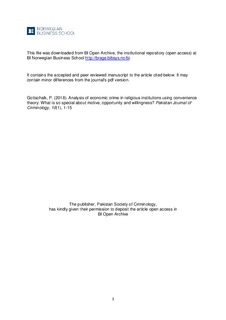| dc.contributor.author | Gottschalk, Petter | |
| dc.date.accessioned | 2018-06-25T08:05:25Z | |
| dc.date.available | 2018-06-25T08:05:25Z | |
| dc.date.created | 2018-06-16T16:28:30Z | |
| dc.date.issued | 2018 | |
| dc.identifier.citation | Pakistan Journal of Criminology. 2018, 10 (1), 1-15. | nb_NO |
| dc.identifier.issn | 2074-2738 | |
| dc.identifier.issn | 2222-6648 | |
| dc.identifier.uri | http://hdl.handle.net/11250/2502752 | |
| dc.description.abstract | There is a research debate whether or not religious people demonstrate less delinquent behavior in terms of white-collar crime. This article focuses on those members of religious institutions who become offenders, and the article attempts to explain their behavior by the theory of convenience. Convenience theory suggests that the extent of white-collar crime is determined by financial motive, organizational opportunity, and personal willingness. As described in this article, religiosity may influence motive, opportunity, as well as willingness. The motive can be a greater good, the opportunity can be the lack of control because of trust, and the willingness can be the availability of forgiveness. | nb_NO |
| dc.language.iso | eng | nb_NO |
| dc.publisher | Pakistan Society of Criminology | nb_NO |
| dc.title | Analysis of economic crime in religious institutions using convenience theory: What is so special about motive, opportunity and willingness | nb_NO |
| dc.title.alternative | Analysis of economic crime in religious institutions using convenience theory: What is so special about motive, opportunity and willingness | nb_NO |
| dc.type | Journal article | nb_NO |
| dc.type | Peer reviewed | nb_NO |
| dc.description.version | acceptedVersion | nb_NO |
| dc.source.pagenumber | 1-15 | nb_NO |
| dc.source.volume | 10 | nb_NO |
| dc.source.journal | Pakistan Journal of Criminology | nb_NO |
| dc.source.issue | 1 | nb_NO |
| dc.identifier.cristin | 1591675 | |
| dc.description.localcode | 1, Forfatterversjon | nb_NO |
| cristin.unitcode | 158,4,0,0 | |
| cristin.unitname | Institutt for ledelse og organisasjon | |
| cristin.ispublished | true | |
| cristin.fulltext | postprint | |
| cristin.qualitycode | 1 | |
